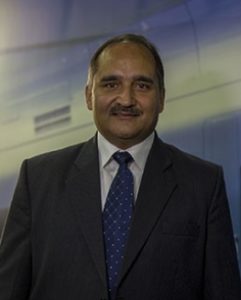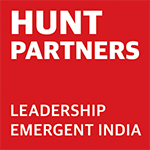Bharat SalhotraManaging Director – Alstom Transport
Bharat Salhotra has been the Managing Director of Alstom Transport since July 2013 and is responsible for Expanding Alstom footprint in India and South Asia. He has been appointed as Chevalier de l’Ordre national de Merite by President of French Republic. He has over 10 years of rich experience in senior executive roles managing several businesses including Dedicated Freight Corridor Corporation, Indian Railways and Center for Railway Information Systems . He served Dedicated Freight Corridor Corporation for 5 years , as the Group General Manager Corporate Finance and then promoted as the Director-Finance.
Mr. Bharat holds B.Tech Mech degree from Punjab Engineering College , PGDM- Finance Systems from Indian Institute of Management, Calcutta and MBA, Leadership, Supply Chain Management from Massachusetts Institute of Technology – Sloan School of Management.

1. What was the mandate given to you by the Board when you took over in your role?
To grow business in India. Alstom Transport had been struggling to make inroads in the Indian Urban Rail as well as Mainline space and there was a cleart mandate that we should be able to win more orders and grow the business in India.
2. How much of that has been achieved? What were the challenges faced?
We have not only grown business in India but also extablished India as a Center for exports to markets in Asia pacific & beyond.
3. What are the key challenges your organization is facing currently?
We face a very vibrant market and in order to keep pace with the burgeoning market needs, we need to develop the organnizational maturity to be able to handle the growth. That needs skilled manpower and this is one area of concern. The second challenge relates to the market structure itself – we would like to get an opportunity to execute contracts on turnkey basis because we believe that is the most efficient and least cost from a public policy perspective.
4. What are the key challenges for the sector?
The sector is expanding but it lacks standardization and that is one major area of concern.
5. What is your talent strategy? How do you draw the balance between home grown vs lateral hiring at the leadership level?
We strongly believe in localization and we would like to develop local leaders for local markets. In facct, we believe that once we have developed the organnizational maturity, we can be the base for developing several innovative and least cost options for the entire emerging world. In that sense, we believe we can adopt the “think local act global” approach.
6. How does your organization identify and develop future leaders?
We have a well established process not just for talent acquisition but also talent development. We run special leadership programs wherein we identify younfg leaders through the People Review Cycle and then invest in them and help them realise their career aspirations.
7. In a world full of volatility, Uncertainty, complexity & Ambiguity (VUCA) and also being closely involved with government, what is your strategy to manage various stakeholders to get the desired outcome?
We help stakeholders by reaching out to them first and understanding their concerns and their expectations. We help them evaluate alternatives and work closely with them to structure their requirements that will help them achieve the desired outcomes in the shortest possible time and at the lowest cost.
8. How do you define & practice leadership?
Leadership means ability to energise and motivate teams towards a common objective. It means cultivation and collaboration. It means leading, supporting, nudging, facilitating the team in reaching their aspirations. It means building multi minded organizations instead to being a mono minded enterprise.
9. How Indian leaders can become Global Leaders?
Indians are well trained to emerge as global leaders. They need to sharpen their soft skills and be aware of cultural differences and the immense importance of building an environment that is enabling.
10. What are the 3 most pivotal moments in your career that you either learned from and/or that got you where you are today?
“One moment was from MIT (Massachusetts Institute of Technology) days when I was a part of a team to do a particular project. We all, the team members, were brainstorming and discussing ideas and went ahead to put the necessary efforts. The program had a set of qualifiers and we all were expected to come up with something keeping them in mind. However, unfortunately, my group ended up last amongst all the participating groups. That was the day I actually understood the significance that ‘team work’ beholds. It was completely a transformational moment for me, the art to build, motivate and the same time to be a part of one group having such different people and mind sets.
Second moment I would like to talk about would be when I got to work across geographies and coping up with cross cultural teams – different working schedules, different approaches and different languages. Driving teams including such a varied set of individuals has been a complete value addition.
There have been a couple of pivotal moments for me that have brought a good learning experience. They have been difficult ones but very much required as well.”
11. What message would you like to share with young professionals at the start of their career?
“Honestly, I believe in a few elements that one should focus on in life and would advise the young age professionals the same. Firstly, Integrity i.e the quality of being true to ourselves and being honest. Integrity, I reckon, is not guiding, it is much more beyond that.
Secondly – You cannot achieve anything alone and one needs to believe this. There are always people and element which lead to success, some of them you can see and some you cannot. There would be support coming to you and you won’t even know and realize it. Third would be ‘aspiration’ in everything what you do. This cannot be that you want be the highest paid employee but something more than that. Like for instance – I want to build more ‘metro cities’ etc which is beyond one’s personal short term goals. To me, success and happiness are kind of unintended by-products. Last but not the least – we all need to believe in distributed leadership. You need to encourage people to disagree with you and only that will lead to initiatives and innovations.”
